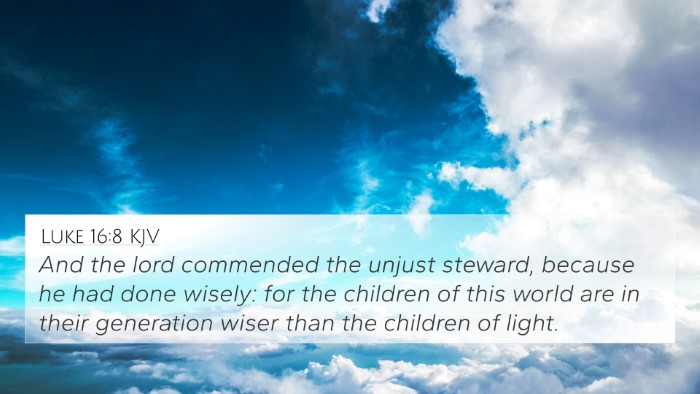Understanding 2 Chronicles 11:23
This verse captures a key moment in the narrative of the kings of Israel and Judah, highlighting the actions and decisions of Rehoboam, Solomon's son, as he established his reign. Given its context, it offers various insights into leadership, wisdom, and moral choices.
Verse Text
2 Chronicles 11:23: "And he dealt wisely, and dispersed of all his children throughout all the countries of Judah and Benjamin, and unto every fenced city; and he gave them victual in abundance. And he desired many wives."
Summary of Meanings
In analyzing 2 Chronicles 11:23, several public domain commentaries provide insight into the verse's implications:
-
Matthew Henry:
He emphasizes Rehoboam's strategic wisdom in distributing his sons across Judah and Benjamin's territories, which helped stabilize his rule and reinforce local leadership. This wise distribution was a tactical move to ensure loyalty and governance within the region.
-
Albert Barnes:
Barnes points out the dual aspect of Rehoboam's choices: while distributing his sons strategically, he also engaged in excessive desires, highlighting a character flaw in his pursuit of many wives which reflected cultural practices but also pointed to future strife.
-
Adam Clarke:
Clarke discusses the implications of wisdom in governance, noting that Rehoboam's actions indicate a mix of prudence and folly, showing how leadership can navigate both intelligent administration and personal weakness.
Thematic Connections
2 Chronicles 11:23 can be cross-referenced with several other Bible verses that illustrate themes of leadership, wisdom, and moral integrity:
- Proverbs 1:5: "A wise man will hear and increase learning." This reflects the importance of wisdom in leadership, echoing Rehoboam's wise administration.
- Proverbs 12:15: "The way of a fool is right in his own eyes, but he who heeds counsel is wise." This emphasizes the value of wise counsel, a principle Rehoboam should have considered.
- 1 Kings 11:3: "He had seven hundred wives, princesses, and three hundred concubines." This connects to Rehoboam's similar desires, warning against the pursuit of many wives akin to Solomon's folly that led to downfall.
- Ecclesiastes 4:9: "Two are better than one, because they have a good reward for their labor." This suggests the benefit of effective partnerships in leadership, resonating with Rehoboam’s distribution of his sons.
- 2 Samuel 15:1-6: Absalom’s rebellion acts as a cautionary tale against misplaced loyalties from sons, showing the dangers of poor leadership decisions.
- 1 Chronicles 2:30: This refers to the support of his family, which connects to the necessary unity and cooperation among rulers and families.
- Psalm 127:1: "Unless the Lord builds the house, those who build it labor in vain." This verse serves as a reminder that spiritual integrity is critical for enduring leadership and governance.
Biblical Cross-Referencing Tools and Methods
Understanding the connections in the Bible can be enhanced through various tools:
- Utilizing a Bible concordance can aid in locating verses that share thematic elements.
- A Bible cross-reference guide helps in identifying scripture that relates to specific verses.
- Cumulative cross-reference systems allow for in-depth studies, uncovering links among different books of the Bible.
- Engaging in cross-reference Bible studies fosters a deeper understanding of interconnections.
Practical Application of Cross-Referencing
To effectively study the Bible, one should consider:
- Identifying connections between the Old and New Testament: Trace themes of wisdom and folly from kings to Christ.
- Detailed cross-reference between Gospels: Look for parallels in leadership styles presented by Jesus and the Old Testament kings.
- Bible verses related to specific themes: Conduct studies on governance and leadership integrity.
Conclusion
In summary, 2 Chronicles 11:23 serves as a vital reminder of the complexities of leadership and the importance of moral uprightness. The lessons derived from Rehoboam's reign reflect eternal truths relevant in both biblical times and today. By employing cross-referencing methods, one can gain a more profound understanding of scripture's cohesive narrative.
References for Further Study
- Use a Bible reference resource for in-depth thematic studies.
- Explore the recurring motifs in scripture through a comprehensive Bible cross-reference method.
- Engage with cross-referenced themes in the Bible to enrich personal or group study sessions.







